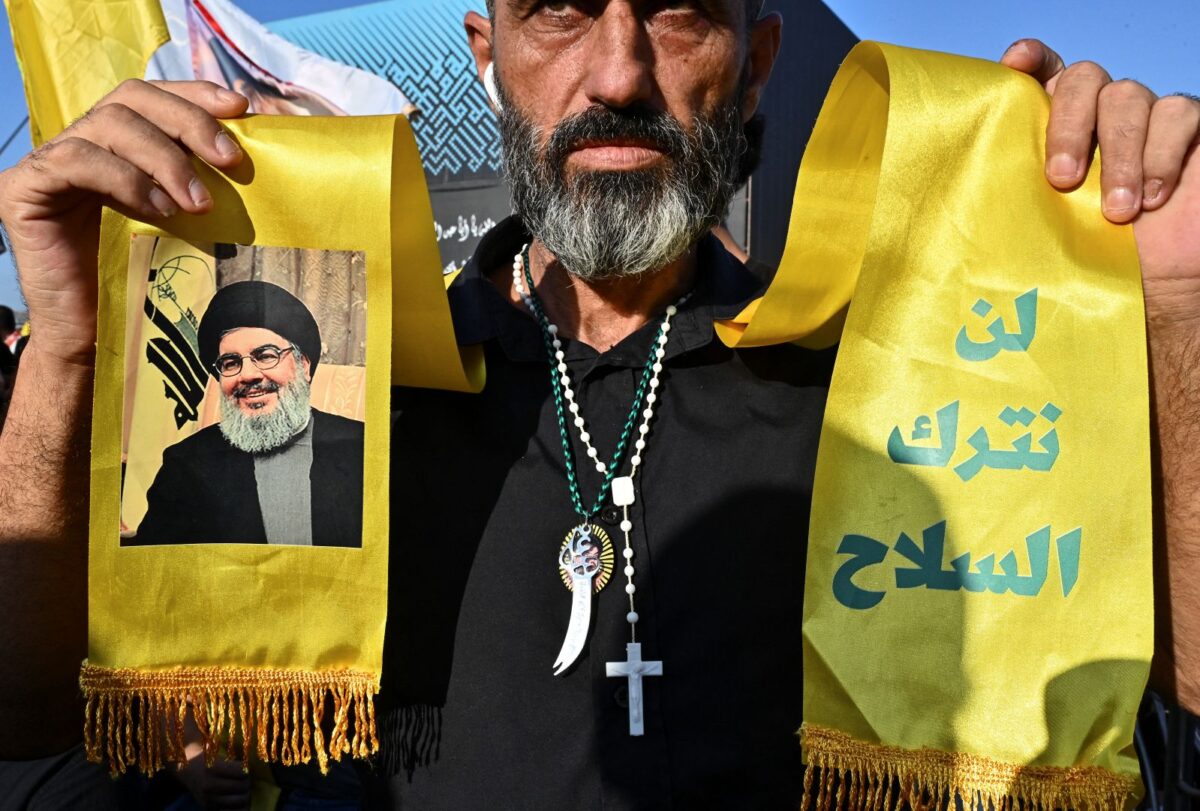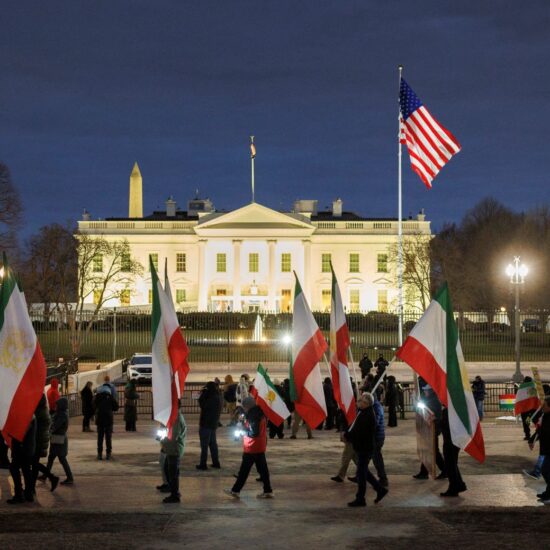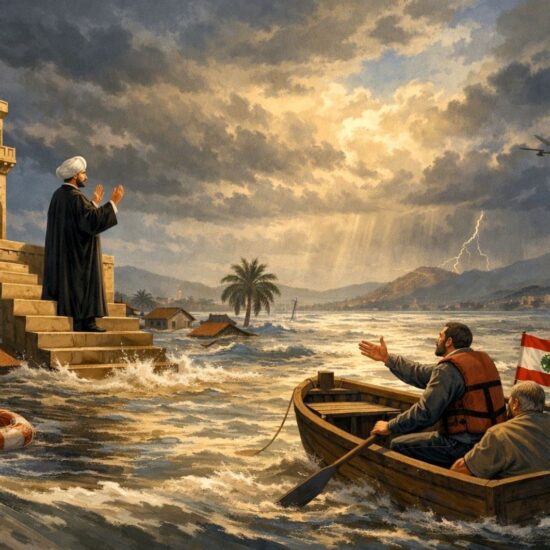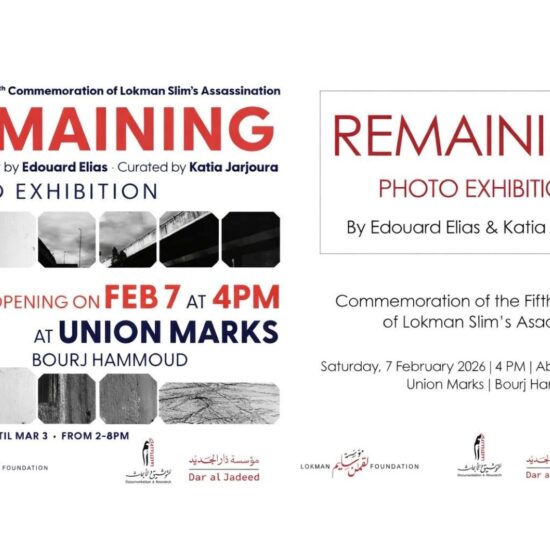
The Lebanese government is under growing strain, with internal divisions deepening and the border situation remaining as precarious as ever
Last week, Lebanon came closer than it has all year to an internal confrontation. The government found itself under severe strain after Hezbollah illuminated Beirut’s iconic Raouche Rock during a mass gathering.
The event marked the first anniversary of the deaths of Hezbollah leader Hassan Nasrallah and his designated successor, Hashem Safieddine, both killed in Israeli airstrikes during the 2024 war on Lebanon. That conflict left thousands dead, including women and children, and its memory remains raw.
In the lead-up to the commemoration, uncertainty surrounded whether Raouche Rock itself would be involved. A poster circulating online, attributed to Hezbollah, invited supporters to attend and hinted that images of Nasrallah and Safieddine would be projected onto the rock. After discussions between government officials and Hezbollah representatives, reports suggested a compromise: the rally could proceed in Raouche, but the landmark would remain untouched.
On the night of the event, however, the rock was illuminated with portraits of Nasrallah, Safieddine, and other political figures — including Saad and Rafik Hariri, as well as parliament speaker Nabih Berri. Senior Hezbollah official Wafic Safa later thanked Army Commander Gen. Joseph Aoun and Maj. Gen. Raed Abdullah for what he described as their contribution to the event’s success.
The move triggered swift political backlash. Prime Minister Nawaf Salam condemned the illumination as a violation of the agreed terms, calling it a “reprehensible behavior” that undermined the credibility of its organizers. He announced that he had instructed the ministers of interior, defense, and justice to pursue legal action, including arrests and investigations. “This will not deter us from rebuilding a state of law and institutions,” Salam said, vowing that his government would continue pressing forward.
Defense Minister Michel Menassa, meanwhile, rejected suggestions that the army bore responsibility for the controversy. He emphasized that the military’s mission was to safeguard civil peace and national unity, noting its sacrifices had been made “without seeking recognition.”
President Joseph Aoun, speaking from New York, phoned Prime Minister Salam to discuss handling the issue in a way that preserves national unity and avoids sectarian tensions.
Following Friday’s cabinet session, it was agreed that accountability would initially focus on the “Rissalat” association, which had filed for the permit, while the broader scope of responsibility remains under investigation.
The episode deepened divisions within the government and fueled public concern, stirring unease across Lebanese society.
In Lebanon
Qassem’s Speech: On Saturday, Hezbollah deputy chief Sheikh Naim Qassem vowed the group would never surrender its weapons, rejecting the Lebanese government’s recent order to disarm and framing the issue as part of an “existential war” with Israel. Speaking to tens of thousands of supporters marking one year since the killing of his predecessor Hassan Nasrallah in an Israeli airstrike, Qassem said Hezbollah is rebuilding its military capabilities and remains prepared for further escalation.
Larijani and The Saudis: On Saturday, Ali Larijani, Iran’s former parliament speaker, urged regional unity against Israel and welcomed Hezbollah’s call for improved ties with Saudi Arabia, calling it a “step in the right direction.” He warned that any new Israeli strikes on Iran would be met with strong retaliation, before attending a memorial for slain Hezbollah leader Hassan Nasrallah in Beirut.
More Attacks: On Sunday, the Israeli military reported carrying out an airstrike targeting what it described as a Hezbollah weapons depot in southern Lebanon, part of ongoing series of Israeli attacks on Lebanon.
New Draft: MP Ibrahim Kanaan said the draft law on financial gap and deposit recovery is still under negotiation and will be clarified once sent to Parliament. Speaking to MTV on Sunday, he stressed that deposits should not be written off, proposing a minimum guarantee of $100,000 and a recovery plan using state revenues, Central Bank assets, and reserves, while excluding illicit funds. He also called for accountability for those responsible for Lebanon’s financial collapse and urged audits of bank assets at home and abroad.
Aoun in the US: President Joseph Aoun met U.S. Secretary of State Marco Rubio and other officials at the U.N. General Assembly, urging U.S. pressure on Israel to halt attacks and allow the Lebanese army to deploy south and disarm Hezbollah. Aoun called his meeting with Rubio “positive,” while U.S. representative Gregory Meeks praised his reform efforts and support for the Lebanese Armed Forces. He also met former U.K. Prime Minister Tony Blair.
Patriarch’s Visit: Maronite Patriarch Cardinal Bechara Boutros Al-Rahi emphasized that the South’s survival is essential for Lebanon’s stability, calling the deployment of the Lebanese Army there a sovereign right and national duty. Speaking Sunday at St. George’s Church in Qlayaa, concluding his pastoral tour of southern towns, he praised residents for their resilience amid war and aggression, highlighting the South as a symbol of patriotism, dignity, and coexistence. Al-Rahi stressed that the hardships faced by the South reflect the struggles of the entire nation, and their steadfastness represents a sacrifice for all of Lebanon.
In The Region
Trump Plans: U.S. President Donald Trump told Reuters on Sunday that he has received a “very good response” to his proposal to end the war in Gaza and expressed optimism about securing Israeli Prime Minister Benjamin Netanyahu’s support during their meeting on Monday. He noted that U.S. special envoy Steve Witkoff and his former Middle East envoy, Jared Kushner, are holding discussions with Netanyahu in New York ahead of the White House meeting.
Complicated Relationships: Syrian Foreign Minister Asaad al-Shibani told CNN that Israeli strikes following Assad’s fall have “stunned” Syria and complicated normalization talks. He criticized Israel for “obstructing” the government during sectarian unrest, while noting that a strong, unified Syria would benefit regional security and Israel.
Abbas in the UN: Palestinian President Mahmoud Abbas said via video that over 220,000 Palestinians have been killed or injured in nearly two years of fighting, with two million facing starvation. He condemned Israel’s actions in Gaza and the West Bank as “war crimes and crimes against humanity,” citing widespread destruction of homes, infrastructure, and religious sites, and warned that settlement expansion threatens to divide the West Bank and undermine a two-State solution.
Sharaa for the First Time: Syrian President Ahmed al-Sharaa attended the U.N. General Assembly in New York—the first Syrian head of state in nearly six decades. On the sidelines, he met U.S. Secretary of State Marco Rubio and spoke at a political forum alongside retired U.S. General David Petraeus.
SANA also reported that the president met US president Donald Trump on the sidelines of the UN general assembly, with a photo showing the Syrian president meeting the US president and his wife, Melania.
What We Are Reading
Resistance as a Means, Not a Fate: Lessons from Elias Atallah: Managing editor of NOW Lebanon, Makram Rabbah, wrote about Elias Atallah’s interview reflecting on Lebanon’s past resistance, emphasizing ethics, self-criticism, and accountability. Atallah warns against turning weapons into a profession or hijacking “resistance” for political gain, arguing that true resistance serves the state, upholds justice, and defends a free and unified Lebanon.
The Sovereignty Trap: Why Containment Is Not a Solution: Political psychologist Ramzi Abu Ismail wrote that recent events in Lebanon highlight the country’s crisis of dual sovereignty, with Hezbollah’s rearmament undermining the state and Israel’s strikes reflecting the same security dilemma. He argues that true peace requires decisive state-led disarmament and the restoration of sovereignty, not temporary containment.
Raouché and the Politics of Suicide: Hezbollah’s Theatrics of Decline: Managing editor of NOW Lebanon, Makram Rabbah, wrote that Hezbollah’s Raouché Rock display sent a clear political message, highlighting the party’s continued influence and the challenges facing Lebanon’s state authority. He noted that the incident underscores the broader debate over disarmament and the role of non-state actors in Lebanese politics.








